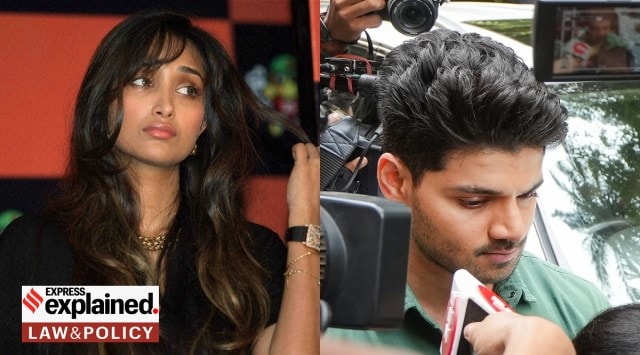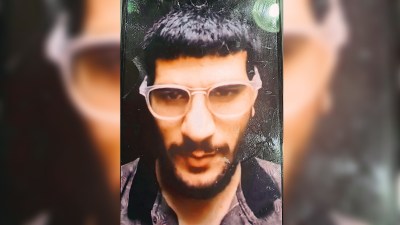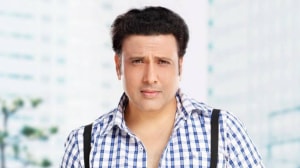Actor Sooraj Pancholi acquitted in Jiah Khan suicide case: Understanding the abetment of suicide law
Abetment of suicide is a serious offence that is punishable by imprisonment up to ten years. However, it is not easy to prove in a court of law.
 Jiah Khan (left) and Sooraj Pancholi outside the CBI court earlier today, prior to the verdict. (Express Archive/PTI)
Jiah Khan (left) and Sooraj Pancholi outside the CBI court earlier today, prior to the verdict. (Express Archive/PTI) A special CBI court on Friday (April 28) cleared actor Sooraj Pancholi of the charge of abetting the suicide of actor Jiah Khan in 2013 due to lack of evidence.
“Due to paucity of evidence, this court can’t hold you (Sooraj Pancholi) guilty, hence acquitted,” Judge AS Sayyed of the special CBI court in Mumbai said.
Responding to the acquittal, Rabia Khan, Jiah’s mother, said that she will approach the High Court regarding this issue. “The charge of abetment to suicide has gone. But how did my child die? This is a case of murder…will approach the High Court,” she said.
What is the case about?
Actor Jiah Khan, best known for her debut role in Amitabh Bachchan starrer Nishabd, died by suicide at her Juhu home on June 3, 2013.
On June 11, actor Sooraj Pancholi was arrested on the basis of a six-page note written by the actor. In the note, Jiah wrote about the “trauma and abuse” suffered at the hands of her “lover” (not mentioned by name in the letter). After Khan’s death, her mother and other relatives accused Sooraj of “not respecting Jiah” and “using foul language, hitting her”. These accusations were dismissed by Sooraj and his father, actor Aditya Pancholi.
Pancholi was charged under section 306 (abetment of suicide) of the Indian Penal Code. The trial in the case began in 2019. The prosecuting agency, the Central Bureau of Investigation, examined 22 witnesses in the case, including Khan’s mother Rabia and her sisters.
Notably, Rabia had sought for Pancholi to face charges of murder, claiming that Khan had not died by suicide. She filed multiple pleas in the Bombay High Court and Supreme Court to this effect.
What is the crime of ‘abetment of suicide’?
The Indian Penal Code, 1860 makes abetment of suicide a punishable offence. Section 306 of the IPC prescribes either a jail term of up to ten years or a fine or both.
“If any person commits suicide, whoever abets the commission of such suicide shall be punished with imprisonment of either imprisonment for a term which may extend to ten years, and shall also be liable to fine.”
Generally, the fine is paid to the kin of the deceased.
The IPC also has a separate chapter on abetment and describes who is an abettor under Section 108. Abetment is defined as including instigating, engaging in a conspiracy or assisting in committing the offence.
How serious is the offence of abetment?
Abetment of suicide is a serious offence that is tried in a Sessions court and is cognizable, non-bailable and non-compoundable.
A cognizable offence is one in which a police officer can make an arrest without a warrant from a court. A non-bailable offence means bail is granted to the accused at the discretion of the court, and not as a matter of right.
A non-compoundable offence is one in which the case cannot be withdrawn by the complainant even when the complainant and the accused have reached a compromise. The court cannot allow withdrawal of a case involving a non-compoundable offence, and every such complaint is necessarily followed by a trial where evidence is held against the accused.
So does that mean abetment of suicide is the same as murder?
No, it does not. The Supreme Court clarified this issue in 1997 in the case of ‘Sangarabonia Sreenu v State of Andhra Pradesh’.
Despite the intention of the accused to drive a person to commit suicide, abetment of suicide is not the same as murder. Although in both cases, causing the death of another person is a common factor, the two are distinct offences.
In the case of a murder, the final ‘act’ of causing the death of a person is committed by the accused which is not the case in abetment of suicide.
How will a court determine if the accused has abetted the suicide?
There are two primary ingredients of the crime of abetment of suicide. First is a suicidal death. The second ingredient is the intention of the accused to abet such suicide.
Legally, whether a death is a suicide or not is a determination of a fact, which means evidence has to be evaluated to pronounce that death is a suicide. In common parlance, the word suicide is liberally attributed to every case of self-destruction, but suicide is never presumed. A determination of suicide is made when the deceased person is understood to have known the probable consequence of what the self-harm is about to do to the person and yet, does so intentionally.
Once such a determination is made, then the intention of the person accused of abetment of suicide is looked into.
The only exception to this is the abetment of the suicide of a woman married for seven years or less.
Through an amendment in 1983 in the Code of Criminal Procedure, the law was changed to presume that the husband is guilty if his wife commits suicide within seven years of the marriage. The amendment was made to curb rising dowry deaths that were categorised as suicides.
How is the intention to drive a person to suicide determined by the court?
The intention is discerned from acts of the accused in proving any crime. Multiple rulings of the Supreme Court, including a 2002 ruling in the case of ‘Sanjay Singh v State of Madhya Pradesh’, have held that a comment or a statement uttered in haste, anger would not amount to abetment of suicide.
In a recent 2017 ruling, the apex court also said that instigation, involvement of the accused must be connected strongly and any remoteness in these features would be insufficient to charge the accused with the offence.
Suppose, Person A says “go, die” to Person B and B happens to hang herself to death subsequently, Person A cannot be charged with abetment to suicide. Firstly, A did not intend to instigate B to commit suicide and merely uttered the words in a fit of anger. In such a case, the court would look into Person A’s general behaviour towards B and determine the intention.
In the same case, if a husband and his family have subjected the wife to continuous physical abuse since the marriage and drove her to commit suicide, they can be held liable for the offence. Instigation has to have certain continuity, happen continuously over a reasonable period of time. The suicide must also be a direct consequence of the instigation and cannot be a mere coincidence or very remote to the committing of suicide.
Additionally, if the deceased person is found to be very sensitive compared to a reasonable person, the court has said that the charge of abetment to suicide would weaken.



- 01
- 02
- 03
- 04
- 05



































